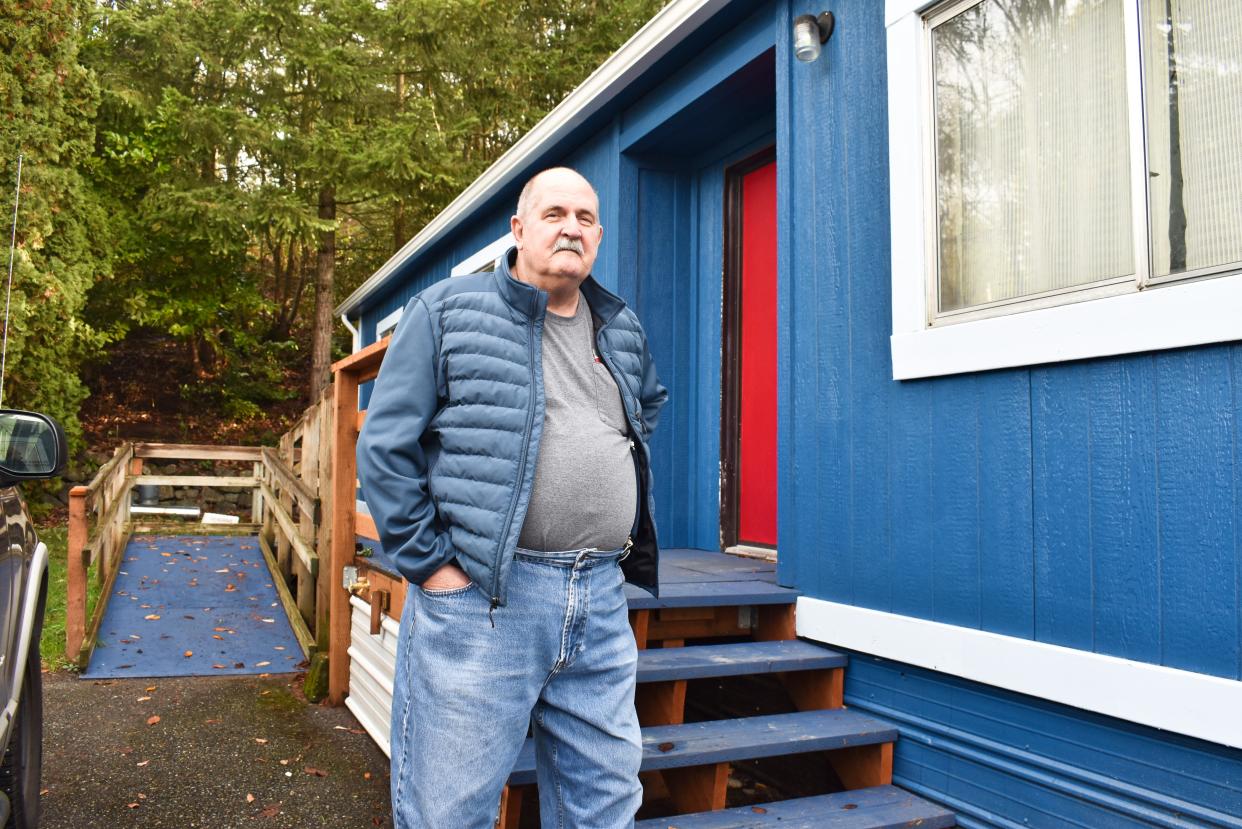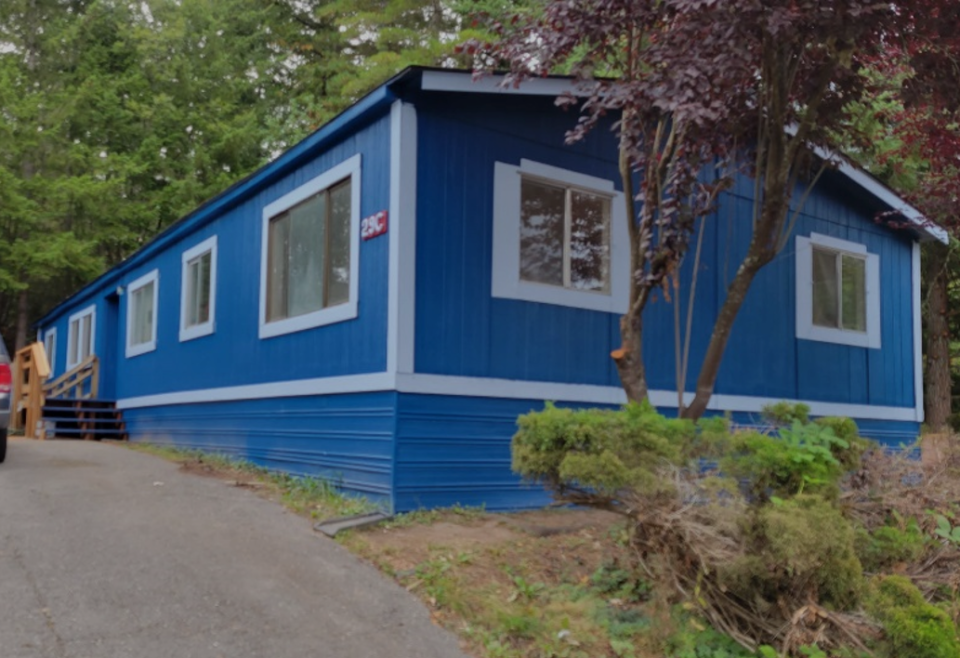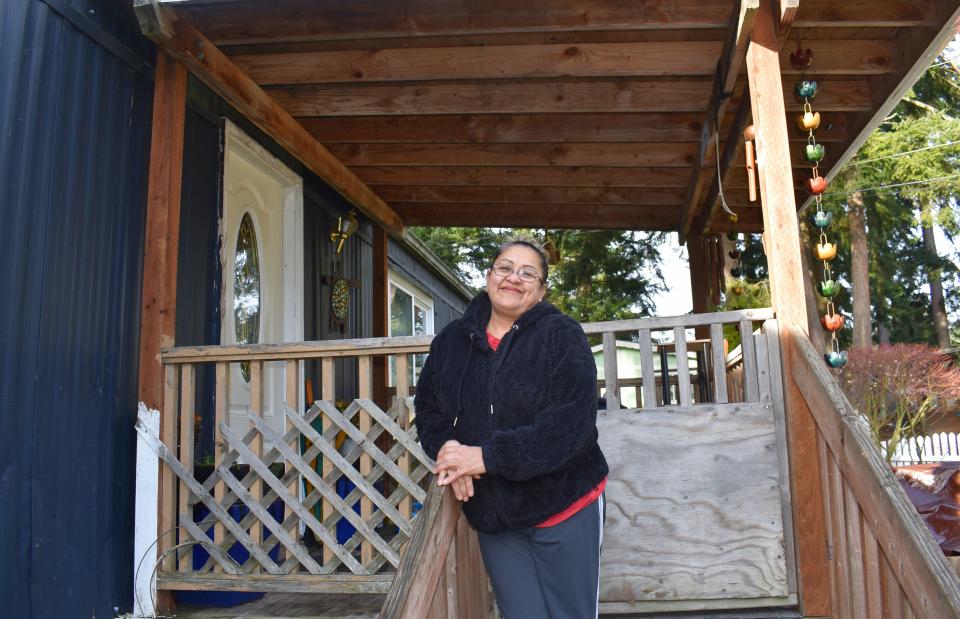Year in review: After community responds, threat of evictions in Poulsbo subsides

Editor's note: As 2023 winds to a close, the Sun is checking in on a few stories reported earlier in the year, as an update on the people involved. Today, we catch up with residents in the Poulsbo Mobile Home Park, where letters demanding upgrades on homes and rumors of eviction swirled last spring before a community response.
POULSBO -- At one point, Robert Carlyle could see the stars through a hole in the roof of his mobile home. He’s lived in the Poulsbo Mobile Home Park since 1990 and has received some help repairing glaring issues over the years. But when he received a notice last spring that his dilapidated home would have to meet specific standards under new park ownership, he fell to his knees.
The notice from a new owner, GSC Investments, outlined an array of cosmetic standards concerning paint, porches, yards, stairways and more that his unit needed to comply with, at Carlyle's own cost, or face eviction. Carlyle’s unit hadn’t received an individual inspection at that point.
“I paid for this house and this is where I'm going to end,” said Carlyle. Though he has experience in construction, Carlyle is retired and has had five heart attacks. Upon receiving the notice from park management, “I looked at it, I laughed really hard until I started crying, and then I just fell… The only thing I could do was to keep my sanity. I just tried to put it out of my mind.”
Unable to make or finance the required improvements himself, Carlyle’s home remained in disrepair until an individual from a volunteer group known as the Bluebills, Bob Keever, came knocking at his door.
In May, the Kitsap Sun reported that some residents in the 76-unit Poulsbo Mobile Home Park had received notices like Carlyle’s, which listed a series of violations per unit, requiring that residents make exterior repairs within 20 days or face eviction. The Peninsula Support Organization Bluebills, a group of retired Boeing engineers working as handymen, then began volunteering their time to repair and beautify mobile homes at the park for those in the most dire need. Later, Paras Shah, a co-founder of GSC investments told the Sun that the 20-day notice to comply wouldn’t be enforced through the rest of 2023.
After coordinating with site managers, residents, improvement notices from park owners and possible inspection reports from owners as well, Bluebills volunteers created work plans for ten units to make the improvements that the residents would need to avoid eviction, said technical lead Michael Crovitz. The Bluebills were backed by $15,000 from the City of Poulsbo and $20,000 from Kitsap Community Resources.
But as winter weather set in, the Bluebills had to pause operations in the mobile home park in October, with many homes still left to service, said social worker Lisa deFaria, who has been helping to coordinate volunteers, materials and funds for the project.
In the meantime, the activists were left with some critical unknowns, deFaria said. Would the Bluebills be able to maintain their momentum next construction season with enough volunteers to pick up their projects in full force, come springtime? And were the completed repairs sufficient enough to curb the possible evictions?

The 'angels' who answered the call
Carlyle no longer sees the stars through his roof, and thanks to the Bluebills, the exterior of his mobile home looks as good as new.
Bluebills volunteers rebuilt Carlyle’s wheelchair ramp and front and back porches, repaired the unit’s skirting and siding, reframed a wall, drywalled his bedroom, laid down new flooring, repainted the exterior and more.
“These are my angels,” Carlyle said.
Carlyle’s home was one of ten units, housing 25 to 30 people, that the Bluebills completed exterior repairs on over the summer, reported the City of Poulsbo. Low-income or disabled residents, seniors, retirees and extended families saw their plumbing, siding and windows to gutter systems, stairs, paint jobs and landscapes all repaired or replaced by the volunteer group at no cost. Some residents were able to complete their own improvements as well.
From June to October, the Bluebills worked three days a week for about eight hours each, said Keever, who clocked about 200 hours a month, himself.
Over 60 volunteers worked over 2,150 hours at the Poulsbo Mobile Home Park over the summer, deFaria said, as neighbors, friends, teachers, local businesses and organizations like the Poulsbo Rotary Club all donated their time and resources.

Lucia Lopez, who lives with her extended family, got help from the Bluebills to replace her front door weather striping, leaky awning, front porch, windows, stair and gutter, among other improvements.
“I don't even have money, I don't even have anybody to help me and then I need to have to get another job probably so I can afford the cost,” said Lopez, with translation from her friend and neighbor Sandra Duran. “It was hard for her because her husband left her behind with all the bills and stuff without even thinking about her,” Duran said.
Lopez has lived in the Poulsbo Mobile Home Park for 24 years with her extended family and even gave birth to her daughter there. But when her daughter read her the notice requiring repairs, she thought she might have to pick up and leave her beloved home.
“It was a very good help for her to have these guys to help her with everything, and so at least that’s some relief to say, ‘hey I'm not going to be worrying more about being evicted.’” Lopez said through Duran. “She says she’s happy now, happy that she (doesn’t) have to do that anymore.”
Volunteers working under pressure
Though the Bluebills have brightened smiles and made strides for the mobile home residents most in need – who Crovitz fondly refers to as the “women and orphans” of the park, residents and advocates were left wondering if the repairs met the standard of the owners. During the construction season, workers and residents only heard confirmation of the repairs from park site managers, Josh and Shanna Brooks.
“I think most of (the residents) are crossing their fingers and hoping that this has all gone away,” deFaria said. “If we move forward, there has to be some assurance that it's for a value, that these people will be assured some security, some safety.”
GSC Investments hadn’t provided any confirmation to residents whether or not the fixes to homes resolve the violations of the park standards. Aside from an update from Shah shared by the Sun in July that enforcement of the 20 day period would be delayed until 2024, the team hadn’t received any communication from the park owners, until deFaria reached Shah via email on December 12.
The inspections and subsequent notices of violation “are not intended to be an avenue for evictions and that is not our goal when we issue them,” Shah said to deFaria in an email.
“Just like how an HOA operates, we expect residents to comply to the rules and regulations… to address safety hazards that are common with older homes and to improve the quality of homes and lots so that the community remains a high quality, safe, and clean place to live.”
Shah told deFaria that inspections at the park would happen annually in the spring and summer in batches, so that those who received inspections and were told what improvements they needed to make wouldn’t have to make repairs during the winter, which Crovitz found reassuring.
“There's no risk of eviction,” Shah told the Kitsap Sun definitively in an interview. “The reality is in the State of Washington, despite what RCW says, you're not going to get a judge to agree to an eviction based off of a home or law standard violation. And that's just not how we operate.”
The 20-day compliance period is not a “hard and fast rule,” Shah said. No fines will be issued for non-compliance either, and park owners have worked with residents situationally to cover improvement costs with a zero-interest payment installment plan.
Though Shah told deFaria that the Bluebills’ repairs have addressed the issues identified in the inspections from spring and summer, GSC Investments does not provide written confirmation to residents as certain improvements could later fall into disrepair, he said to the Kitsap Sun, but residents can consider verbal confirmation from site managers that repairs have met park standards authentication from the owners.
“I think it's unique to find situations like this where you have different stakeholders all working together to try to solve a certain goal,” Shah said in reference to collaboration between citizen advocates, municipalities and volunteer organizations to deliver the required improvements. “We are very appreciative of everyone's efforts and certainly want to make sure we can open dialogue with everyone in ways that we can assist.”
The park owners will do another round of inspections in the spring and summer, after which those residents will receive a notice about ten days later regarding the repairs they will need to make in order to be in compliance with park standards.
“I think the degree of outreach efforts put in, seeing a whole community rise up around (the residents) to help them – that's telling these owners they've got to step very carefully,” posited deFaria. “They know that the local governments, local nonprofits, the Rotary and everybody's watching.”
More homes on deck for help in 2024
Though the pressure on residents may have eased, the urgency to provide timely improvements for those in need hasn’t.
Keever and Crovitz are helping residents with interior repairs during the winter, but come April or May, they hope to be back in full force and complete improvements on more units than last year.
With months of experience, a growing base of volunteers from community outreach campaigns and the houses with the most expensive need out of the way, Crovitz estimates the Bluebills might only need one more year to complete their projects in the Poulsbo Mobile Home Park. There might be 12 to 15 homes left that are at high risk, he said.
Though still less than half of the units have received inspection and a subsequent list of repairs needed specific to their unit, the Bluebills are still coordinating with site managers and have created a working list of homes to begin work on next.
And after meeting with Poulsbo Mayor Becky Erickson and the City Council, Keever and Crovitz are confident that the city will allot another $15,000 of materials for their work in 2024.
deFaria is still looking towards additional grants and is searching for more volunteers.
Some Poulsbo Mobile Home Park residents may be out from under the pressure of improvements, but many are still contending with climbing rental increases under the new ownership in the meantime. Duran saw her rent increase 63% from $460 per month to $750 per month in November.
Lupita and Cuauhtemoc Gomez, Duran’s neighbors and compadres – the godparents to her children – contended with smaller rent increases this year, but both still have had to work overtime to make ends meet.
“We're very strong people,” Cuauhtemoc Gomez said. “We don't want to move. This is our house, this our country.”
While winter weather arrests exterior repairs, Carlyle and his grandson are busy working on interior repairs, laying new flooring and rebuilding the inside of a wall before moving on to repair the bathroom.
The two came upon an adorable surprise while cutting into the floor with a sawzall, Carlyle said. After hearing meowing from below, Carlyle and his grandson pulled three days-old kittens hiding beneath the floor. They’ve been bottle feeding the kittens ever since and hope to find a new home for at least two of them by Christmas.
This article originally appeared on Kitsap Sun: Bluebills volunteers help Poulsbo Mobile Home Park residents eviction
